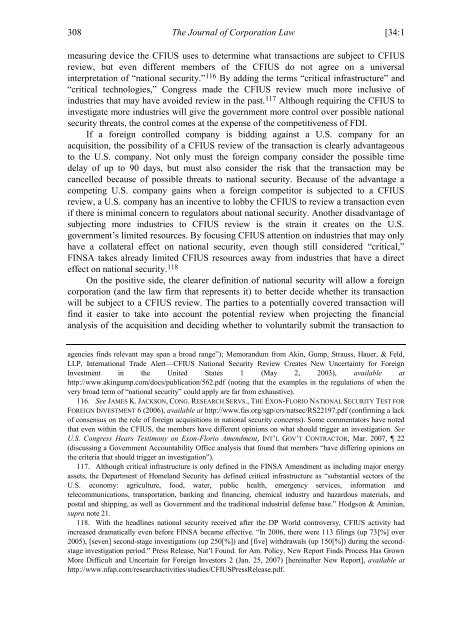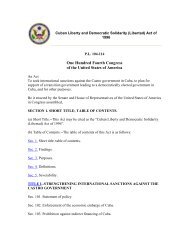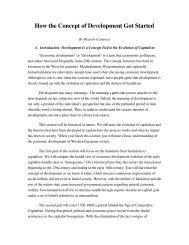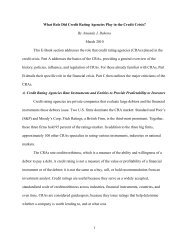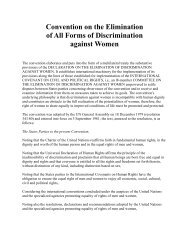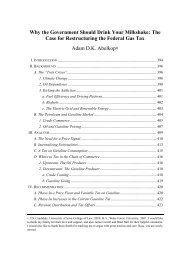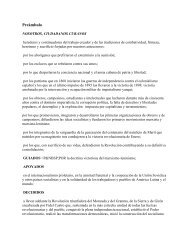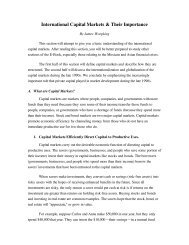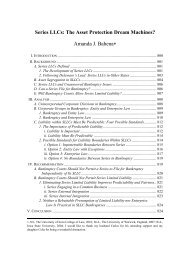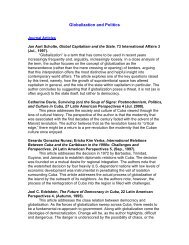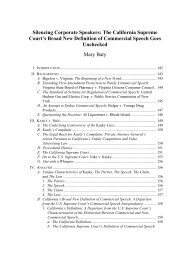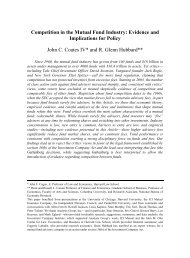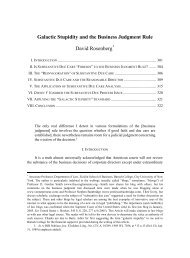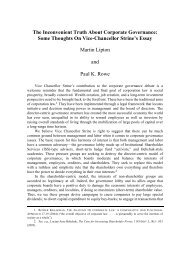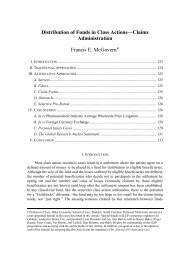Regulation of Foreign Direct Investment After the Dubai Ports ...
Regulation of Foreign Direct Investment After the Dubai Ports ...
Regulation of Foreign Direct Investment After the Dubai Ports ...
Create successful ePaper yourself
Turn your PDF publications into a flip-book with our unique Google optimized e-Paper software.
308 The Journal <strong>of</strong> Corporation Law [34:1<br />
measuring device <strong>the</strong> CFIUS uses to determine what transactions are subject to CFIUS<br />
review, but even different members <strong>of</strong> <strong>the</strong> CFIUS do not agree on a universal<br />
interpretation <strong>of</strong> ―national security.‖ 116 By adding <strong>the</strong> terms ―critical infrastructure‖ and<br />
―critical technologies,‖ Congress made <strong>the</strong> CFIUS review much more inclusive <strong>of</strong><br />
industries that may have avoided review in <strong>the</strong> past. 117 Although requiring <strong>the</strong> CFIUS to<br />
investigate more industries will give <strong>the</strong> government more control over possible national<br />
security threats, <strong>the</strong> control comes at <strong>the</strong> expense <strong>of</strong> <strong>the</strong> competitiveness <strong>of</strong> FDI.<br />
If a foreign controlled company is bidding against a U.S. company for an<br />
acquisition, <strong>the</strong> possibility <strong>of</strong> a CFIUS review <strong>of</strong> <strong>the</strong> transaction is clearly advantageous<br />
to <strong>the</strong> U.S. company. Not only must <strong>the</strong> foreign company consider <strong>the</strong> possible time<br />
delay <strong>of</strong> up to 90 days, but must also consider <strong>the</strong> risk that <strong>the</strong> transaction may be<br />
cancelled because <strong>of</strong> possible threats to national security. Because <strong>of</strong> <strong>the</strong> advantage a<br />
competing U.S. company gains when a foreign competitor is subjected to a CFIUS<br />
review, a U.S. company has an incentive to lobby <strong>the</strong> CFIUS to review a transaction even<br />
if <strong>the</strong>re is minimal concern to regulators about national security. Ano<strong>the</strong>r disadvantage <strong>of</strong><br />
subjecting more industries to CFIUS review is <strong>the</strong> strain it creates on <strong>the</strong> U.S.<br />
government‘s limited resources. By focusing CFIUS attention on industries that may only<br />
have a collateral effect on national security, even though still considered ―critical,‖<br />
FINSA takes already limited CFIUS resources away from industries that have a direct<br />
effect on national security. 118<br />
On <strong>the</strong> positive side, <strong>the</strong> clearer definition <strong>of</strong> national security will allow a foreign<br />
corporation (and <strong>the</strong> law firm that represents it) to better decide whe<strong>the</strong>r its transaction<br />
will be subject to a CFIUS review. The parties to a potentially covered transaction will<br />
find it easier to take into account <strong>the</strong> potential review when projecting <strong>the</strong> financial<br />
analysis <strong>of</strong> <strong>the</strong> acquisition and deciding whe<strong>the</strong>r to voluntarily submit <strong>the</strong> transaction to<br />
agencies finds relevant may span a broad range‖); Memorandum from Akin, Gump, Strauss, Hauer, & Feld,<br />
LLP, International Trade Alert—CFIUS National Security Review Creates New Uncertainty for <strong>Foreign</strong><br />
<strong>Investment</strong> in <strong>the</strong> United States 1 (May 2, 2003), available at<br />
http://www.akingump.com/docs/publication/562.pdf (noting that <strong>the</strong> examples in <strong>the</strong> regulations <strong>of</strong> when <strong>the</strong><br />
very broad term <strong>of</strong> ―national security‖ could apply are far from exhaustive).<br />
116. See JAMES K. JACKSON, CONG. RESEARCH SERVS., THE EXON-FLORIO NATIONAL SECURITY TEST FOR<br />
FOREIGN INVESTMENT 6 (2006), available at http://www.fas.org/sgp/crs/natsec/RS22197.pdf (confirming a lack<br />
<strong>of</strong> consensus on <strong>the</strong> role <strong>of</strong> foreign acquisitions in national security concerns). Some commentators have noted<br />
that even within <strong>the</strong> CFIUS, <strong>the</strong> members have different opinions on what should trigger an investigation. See<br />
U.S. Congress Hears Testimony on Exon-Florio Amendment, INT‘L GOV‘T CONTRACTOR, Mar. 2007, 22<br />
(discussing a Government Accountability Office analysis that found that members ―have differing opinions on<br />
<strong>the</strong> criteria that should trigger an investigation‖).<br />
117. Although critical infrastructure is only defined in <strong>the</strong> FINSA Amendment as including major energy<br />
assets, <strong>the</strong> Department <strong>of</strong> Homeland Security has defined critical infrastructure as ―substantial sectors <strong>of</strong> <strong>the</strong><br />
U.S. economy: agriculture, food, water, public health, emergency services, information and<br />
telecommunications, transportation, banking and financing, chemical industry and hazardous materials, and<br />
postal and shipping, as well as Government and <strong>the</strong> traditional industrial defense base.‖ Hodgson & Aminian,<br />
supra note 21.<br />
118. With <strong>the</strong> headlines national security received after <strong>the</strong> DP World controversy, CFIUS activity had<br />
increased dramatically even before FINSA became effective. ―In 2006, <strong>the</strong>re were 113 filings (up 73[%] over<br />
2005), [seven] second-stage investigations (up 250[%]) and [five] withdrawals (up 150[%]) during <strong>the</strong> secondstage<br />
investigation period.‖ Press Release, Nat‘l Found. for Am. Policy, New Report Finds Process Has Grown<br />
More Difficult and Uncertain for <strong>Foreign</strong> Investors 2 (Jan. 25, 2007) [hereinafter New Report], available at<br />
http://www.nfap.com/researchactivities/studies/CFIUSPressRelease.pdf.


